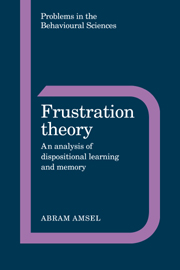Book contents
- Frontmatter
- Contents
- Preface
- List of abbreviations
- 1 Introduction: reward-schedule effects and dispositional learning
- 2 Motivational and associative mechanisms of behavior
- 3 Frustration theory: an overview of its experimental basis
- 4 Survival, durability, and transfer of persistence
- 5 Discrimination learning and prediscrimination effects
- 6 Alternatives and additions to frustration theory
- 7 Ontogeny of dispositional learning and the reward-schedule effects
- 8 Toward a developmental psychobiology of dispositional learning and memory
- 9 Summing up: steps in the psychobiological study of related behavioral effects
- 10 Applications to humans: a recapitulation and an addendum
- Appendix: some phenomena predicted or explained by frustration theory
- References
- Name index
- Subject index
10 - Applications to humans: a recapitulation and an addendum
Published online by Cambridge University Press: 20 March 2010
- Frontmatter
- Contents
- Preface
- List of abbreviations
- 1 Introduction: reward-schedule effects and dispositional learning
- 2 Motivational and associative mechanisms of behavior
- 3 Frustration theory: an overview of its experimental basis
- 4 Survival, durability, and transfer of persistence
- 5 Discrimination learning and prediscrimination effects
- 6 Alternatives and additions to frustration theory
- 7 Ontogeny of dispositional learning and the reward-schedule effects
- 8 Toward a developmental psychobiology of dispositional learning and memory
- 9 Summing up: steps in the psychobiological study of related behavioral effects
- 10 Applications to humans: a recapitulation and an addendum
- Appendix: some phenomena predicted or explained by frustration theory
- References
- Name index
- Subject index
Summary
Temperamental characteristics of human beings, to the extent that they are not the result of inheritance, depend largely, if not entirely, on dispositional learning, a kind of learning that is, in large part, the sum of many experiences with reward and frustration, and that occurs without specific awareness. Dispositions in humans that depend on a history of inconsistent reinforcement (intermittent frustration) may be subject to the same etiological principles that, as we have seen, operate in animals. I have taken the opportunity in several places in this book to give examples of how such principles derived from animal research may apply to humans.
It now seems safe to assert, on the basis of research not only with animals but also with humans, that a connection exists between negative emotional states and frustrative events; between patterns of inconsistent reward and frustration (or smaller and larger reward or immediate and delayed reward) for what seems to be the same behavior (or effort) and persistence; and between principles of instrumental learning derived from such schedules of reward and frustration and accounts of helplessness and depression. In this book, there has been an attempt to show that there is now some basis in learning theory, and particularly in frustration theory, for coming closer to a comprehension not only of the conceptual mechanisms of these relationships, but also of their sequence in development and, to an early approximation at least, their neural underpinnings.
Information
- Type
- Chapter
- Information
- Frustration TheoryAn Analysis of Dispositional Learning and Memory, pp. 216 - 232Publisher: Cambridge University PressPrint publication year: 1992
